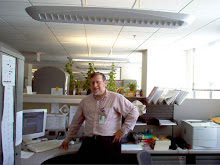Date: Wed, 16 Apr 2008 00:01:08 -0400
From: fyi-poster@umd.edu
Subject: The Role of Transportation in Smart Cities in the Information Age
Gretchen
It is probably not polite to criticize someone that you don't know, so
please excuse me from the start.
But how in the world can the UN predict the percentage of people
living in "urban areas" some 22 years into the future, with an
accuracy of three decimal places???!!!
I doubt that the UN or anyone else can count to that accuracy, even
for today's population.
It definitely depends on how one defines "urban", and so on.
I did some work at a high level political organization, and we had a
hard time just counting employees. Do you count temps? What about
volunteers? And so on. What if someone was hired and didn't start
yet? What about people out on sick leave? With approximately 500
employees, we were lucky to come within 5%.
So I really don't believe the UN statistics.
So why do you quote them?
Anyway, on the topic of the lecture, does the Good Doctor first
preface his theories with defining Social Goals? What is the purpose
of existence? Does the human species require over 8 billion people to
achieve its purpose?
Some human goals could be comfort, technological advancement, art, and
other simple things like "survival".
The major question that I ask to anyone proposing social and human
planning, is "for what are you planning?" For example, do we need all
8 billion to achieve "comfort"? Do we need all 8 billion to achieve
better technology? Or "better art"? (what ever that is.)
Actually not. Is 8 billion better than 4 billion, or just the
opposite? Would "just" one billion suffice? Would 100 million be
enough to ensure survival, and even advance technology, increase
comfort, and so on?
Once these questions are asked and answered (even if the answers would
be "wrong") then and only then does any planning, including
transportation planning, make any sense.
Thanks for listening
Baruch Atta
Subject : The Role of Transportation in Smart Cities in the
Information Age
When : Friday, April 18, 2008 12:00 PM - 1:00 PM
Where : Preinkert Field House (Bldg 54) : 1112V
Event Type(s) : Lecture
According to the UN, the world population could reach 8.2 billion by
2030, with 60.8% living in urban areas. The resources needed to
support that population could be insurmountable. Dr. Tschangho John
Kim, Professor of Urban and Regional Systems at the University of
Illinois Urbana-Champaign, postulates that urban sustainability refers
to an acceptable level of social costs associated with daily
activities of people. Key social costs are related to the use of
scarce urban land, decay of environmental quality, traffic accidents
and congestion. He will examine the role that transportation should
play in intelligent and sustainable development for smart cities.
Website: www.smartgrowth.umd.edu
For more information, contact:
Gretchen Sweeney
Environmental Finance Center
+1 301 405 4035
gsweeney@umd.edu
www.efc.umd.edu

